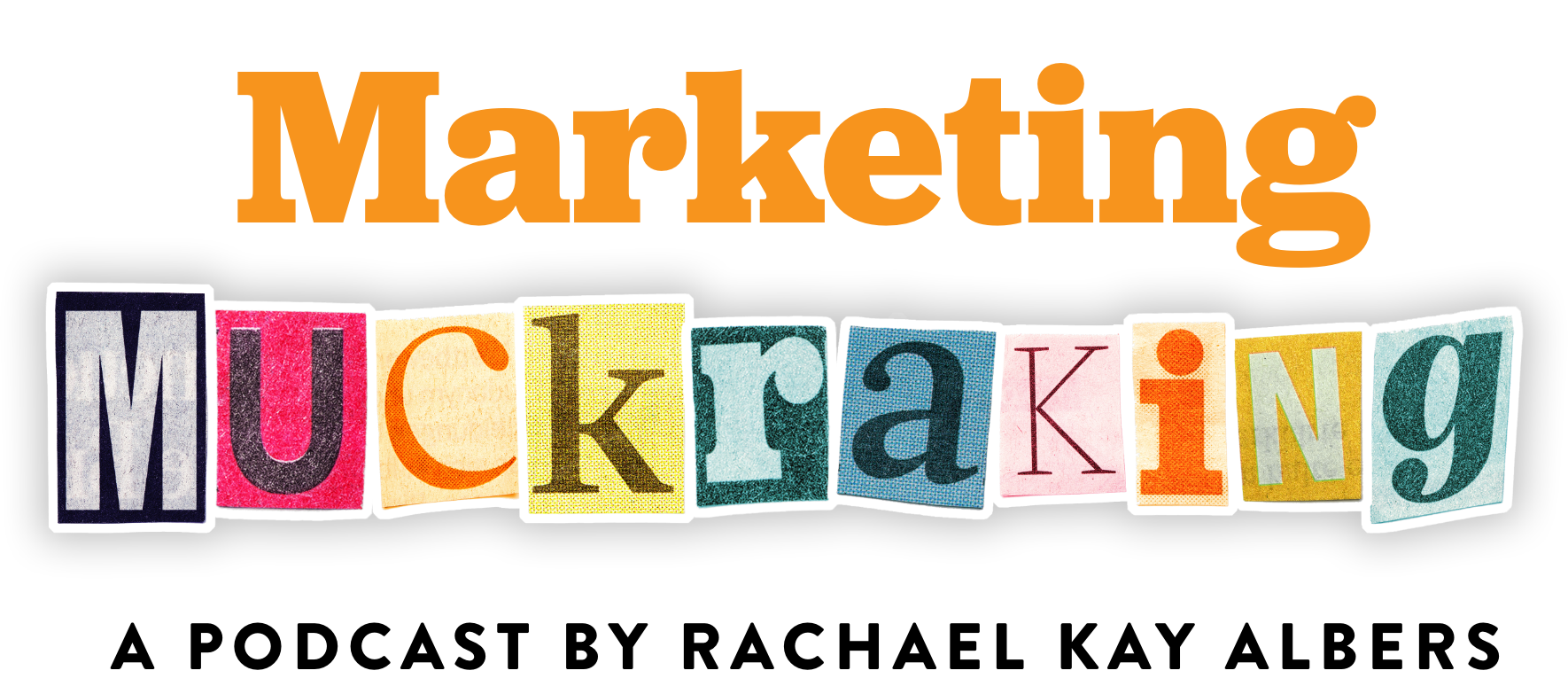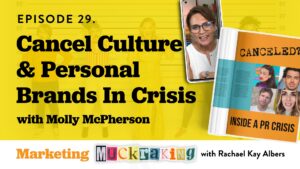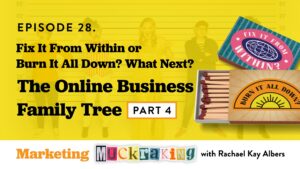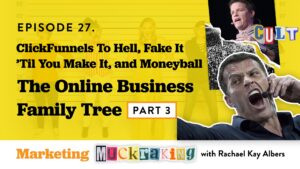If you've ever wondered how the Online Business Industrial Complex was built, this is the 4-part series for you.
I'm joined by Lisa Robbin Young as we trace back how we arrived at this moment in internet marketing and online business, and who are the key leaders who brought us here, starting with Ben Franklin, Henry Ford, and Thomas Edison, all the way to Tony Robbins, Marie Forleo, Jenna Kutcher, Russell Brunson, Brooke Castillo, and Matthew McConaughey? Yeah, he’s a life coach now.
If you don’t know — or care — about these names, never fear. Lisa and I focus on what tactics these leaders popularized and how they’ve invaded nearly every corner of online business.
This series is foundational in understanding the evolution, not only of online business and marketing, but American culture and many of the advertising principles we have come to take for granted as “how it’s done.”
But, as we say on the show, this stuff didn’t start on the Internet — it goes back hundreds of years. To understand marketing history is to understand ourselves and our culture — marketing is the fuel for the engine of capitalism. Let’s take a trip through time, so you can be a more informed consumer and, hopefully, a more ethical marketer.
What you can expect from Part 1 of the Online Business Family Tree:
- Why we're "naming names" and the difference between solopreneurs and corporate entities in girlboss clothing
- How the "American dream" became a sales pitch for individualism at the cost of systemic change
- What muskrats taught Henry Ford and Thomas Edison about making millions
- The surprising secret of how to "think and grow rich"
- Behind the scenes of coaching coaches to coach coaches
- How the Industrial Revolution turned into toxic wellness culture
- Why hating yourself is good for business (online business, that is)
About Lisa Robbin Young
Lisa Robbin Young has 30 years of business experience as a coach and creative entrepreneur: she is an award-winning speaker, best-selling author, and accomplished musician with multiple albums to her credit. You may even recognize her from the Disney+ show “Encore.” She is also the host of the “Creative Freedom” show — I highly recommend her music video parodies. Check out “There are worse things I could do” for a Marie Forleo crossover with Awkward Marketing. She specializes in helping creative entrepreneurs build a business that works for how you’re wired to work.
An annotated guide to the online business family members we discuss in Part 1:

Benjamin Franklin
Benjamin Franklin ran The Junto, also known as the Leather Apron Club, one of the earliest recorded masterminds in American History. (He was also one of America's first advertisers, placing ads in his Old Farmer's Almanac before that was a thing.)
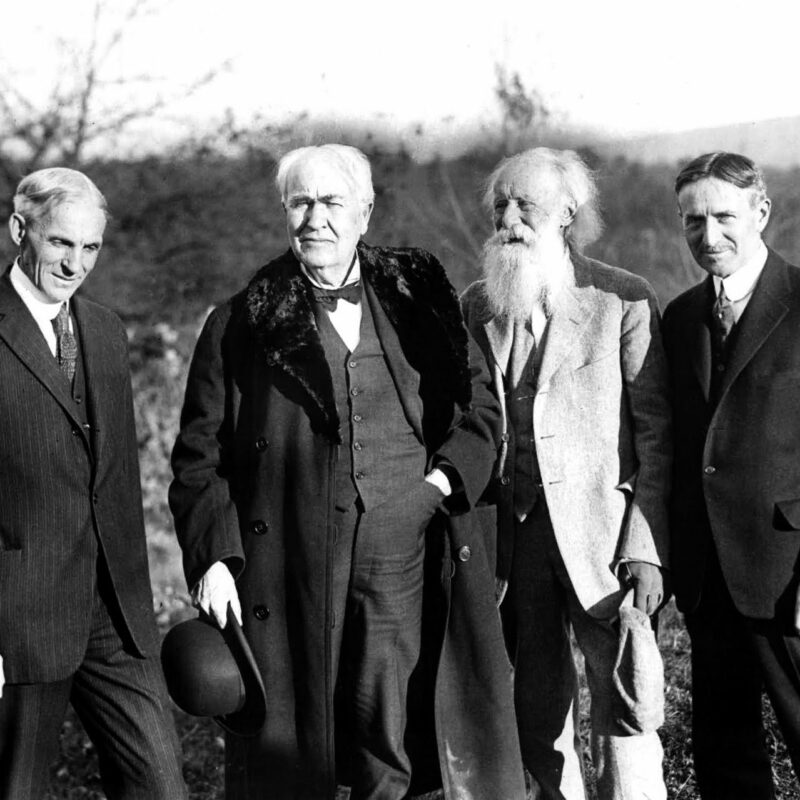
Henry Ford and his "vagabonds": Thomas Edison, Harvey Firestone, and John Burroughs
The early American captains of industry made up one of the first peer-led business masterminds. Ford, Edison, Firestone, and Burroughs would go glamping in the woods to talk shop. Eventually, presidents like Warren G. Harding and Calvin Coolidge joined them.
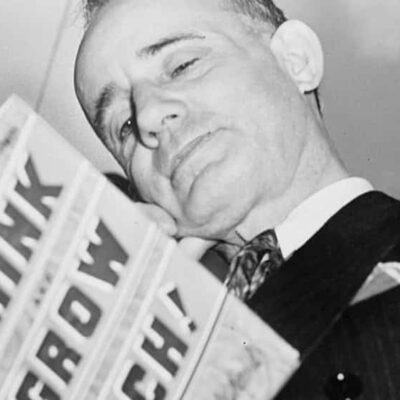
Napoleon Hill, author of Think and Grow Rich
Napoleon Hill published The Law of Success in 1925, which eventually was synthesized into the Reader's Digest version that we know today as Think and Grow Rich, where he wrote about Henry Ford's mastermind as if he was there! (He wasn't.) This book is still heralded as a business bible by many but has been debunked by historians as largely fabricated by Hill.

Tony Robbins
Tony Robbins, who I like to call "Tiny Tony," is one of the world's top grifters. Largely influenced by Think and Grow Rich, he peddles his business and hypnosis-based manipulation to anyone who will throw money at him. His business model is based on cross-pollinating his audience with famous folks whose followers have never heard of him before. All roads lead back to Tony Robbins.

Marie Forleo
Marie Forleo is a business coach who built her B-School empire by playing moneyball, riding coattails, and tucking non-disparagement clauses into her terms & conditions. She has a history of silencing members of her community when they speak up about racism and misogyny in America.

Dan Kennedy
Dan Kennedy led one of the first internet marketing copywriter mastermind groups with Bill Glazer, the Glazer-Kennedy Insider's Circle. He mentored Russell Brunson, who eventually bought the Glazer-Kennedy Insider's Circle and leveraged Kennedy's audience and teachings to expand ClickFunnels, or DickFunnels as we call it around here.

Yanik Silver
Yanik Silver worked with Dan Kennedy to help bring predatory copywriting techniques online. He is often found in search results alongside "get rich quick schemes." Today, he sells "cosmic" oracle cards.
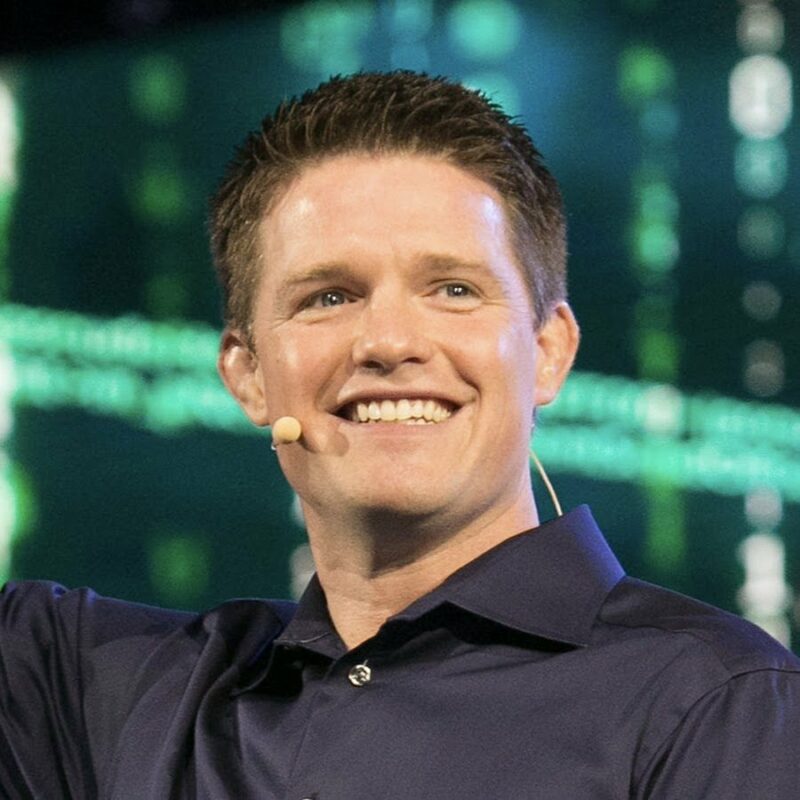
Russell Brunson
Russell Brunson developed ClickFunnels, a software designed to ruin your life and make him rich. Brunson studied mind control and junk mail to build his business and now teaches people how to build cults for cash. Notably, he wrote a book where he cites Hitler as one of his business mentors.
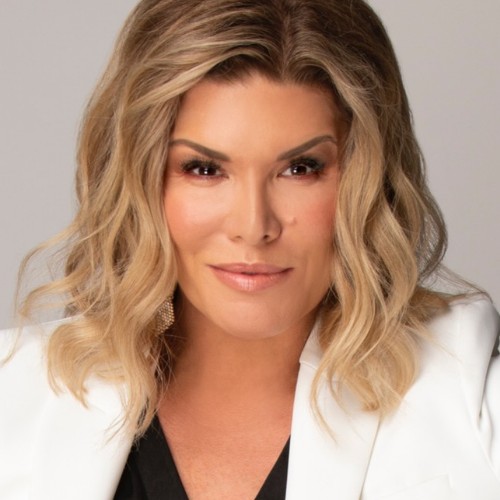
Ali Brown
Ali Brown calls herself "the world's most recognized business coach," but I'll let you be the judge of that. She mentored Marie Forleo and led one of the first 6 figure masterminds. She was also a member of the Glazer-Kennedy Insider's Circle.
Episode Transcript
Rachael Kay Albers: Lisa Robbin Young, I am so thrilled to have you here with us today. What an honor to be co-muckraking with you. Hi, how are ya?!
Lisa Robbin Young: I'm good. I'm really excited and the honor truly is mine. Like, you know, I have stalked you for a very long time and I adore you. So I really appreciate the opportunity to get all historical up in here.
Rachael: Yes, we're co-muckraking. We're burning shit down. We're lighting away to a better future. That's what I'm hoping that we're doing today as we talk about the online business or internet marketing family tree. Although, honestly, not to clickbait people here…but I feel like it's more of like a family circle or the tree just is one long festivus pole. It's just a pole and there’s no branches.
Lisa: It's the online family circle jerk. Can we say that? It's pretty incestuous. I mean, when you really look at the whole spectrum of where some of this stuff came from, a lot of it comes from the same handful of sources that's just trickled down in different ways and moved around through different people over the decades that the internet has been around. And it has really been doing this pretty much since the beginning of the internet and we're going to talk about all that.
Rachael: So, yes, the whole thing we're talking about today is it didn't just appear when MySpace did, right? It's not actually just about the world wide web. And that's kind of what we want to go into is how this goes back all throughout American history, the history of business as we know it today – of modern business. We're not going back thousands of years, although we certainly could. Maybe a part three, we'll do. We'll go back into ancient times – the ancient Napoleon Hill, the ancient Tony Robbins written on cave walls somewhere…
Lisa: Well, when I was researching for our call, because you come so prepared. I was like, I gotta, I gotta step up my game. I was looking at masterminds and we're gonna have a whole conversation, but like one of the first masterminds in the United States that was recorded was Ben Franklin and the Junto in the 1700s.
So, I mean, this stuff's been around and it all trickles back to, or trickles up to, or trickles around to some very interesting players. And I'm really glad to finally get some of this repressed knowledge out of my body and into the world.
Rachael: Yes, you are a wealth of knowledge. You have at least a decade on me in the online business game and the business game, in general, because you were doing sales and marketing before it went online, yeah?
Lisa: Well, I built one of the first ever e-commerce websites, like in 1994. So it's been almost 30 years and we were still taking money orders by mail when PayPal came onto the scene. So it's been a long time. I was that kid in high school who could be in every room and nobody paid any attention to me for the most part, like I was the good little girl.
“Oh, we can do stuff and she's never gonna say anything because she's the good girl!” And that's just carried on with me throughout my life. So I get into these companies where these internet marketers are and I've got my hands dirty in their business, doing whatever it is that they've hired me to do and this stuff starts coming out and I'm like, “How does the world not know this?”
And sometimes I've signed NDAs and sometimes I haven't. And so it's like, what do I share? And what do I not share? And how do I use it ethically for myself and for my clients? So that's kind of the full circle, quick and dirty on thirty years in the online space.
Rachael: We're all fortunate to have this wealth of knowledge with us today and co-muckraking with us and you know, “Why does nobody know about this?” That question? I think we're going to answer that question on today's show. So, we are going back through time to trace the roots of the online business, internet marketing family tree to long before the internet ever existed.
But before we get into all of this juicy and troubling information, I think we should talk a little bit about why we decided to approach this topic this way and why we are choosing to name some of the names of the powerful leaders and to outline it in this format.
Lisa: I know you've articulated this many times. People want us to name names – naming names comes out of a place of genuine desire to be well-informed and to not be that guy and not fall into that trap or not being ensnared by whatever the tactic is that's being employed. And you pointed this out in your pre-marketing: it's less about the bad apples and more about the idea that the whole tree is rotten.
Like, if you really look at it, the rot runs deep and these people, some of them are doing stuff that they've been taught by people who taught them by people who taught them and they don't know, necessarily. And then once they get to a point where they do know, it's like, ‘Well crap, I've built my whole business on this and it works. Now I don't know how to change it because now there's a lot riding on it if I make a change and what if it fails?”
And so my goal is less about – I mean, we're gonna call some names out – but it's more about recognizing what these things are, where they came from so that you can see it no matter what stripes it's wearing. Because a tactic that was employed at the early 20th century is still being employed today. It just looks like girl bosses now, instead of guys in suits, camping out in the woods and we have to recognize it's the same tactic.
So for me, it's about – let's know more so that we can be informed buyers and sellers so that we know what we're getting into and then we can decide for ourselves. “Is that in integrity for me?” And if it's not, then you can choose to do different.
Rachael: Yeah. And like you said, people have asked us and asked each other .It's not just us. People are always curious about, “Okay, you've named this tactic. You've helped to identify this or that predatory behavior or approach. But can you help me better understand who is doing this?” And let me tell you if my whole goal on the planet was just to go viral for the sake of it, then I would be creating content going person by person through this online family tree – circle, pole, whatever you wanna call it – and just creating a video or a podcast episode on each one of them. But the reason that I felt compelled to do this with you and to outline not just the people, but the methods that they have learned and passed down to each other is because yeah, it's not about bad apples. It is about a rotten tree and all of these folks are connected.
The question might come up, “Well, if it's about the methods and it's about the tactics, then why are you deciding to outline some of these leaders’ names?” Because part of how they became influential, wealthy, powerful leaders was by leveraging each other's fame and their personal brands to do it. We're gonna go all the way back to the early masterminds and identify how that was actually part of the pitch.
And I think what's important for us to also note here before we head right into the muckraking is that we're not talking about these people off the clock. I'm talking about the multinational corporate entities with human faces – the girl boss next door, the boy boss next door – who has built an empire on their relatability and leveraged the parasocial bonds that they have with their audiences to make money and become powerful and influential.
And then when the light gets shined on their tactics and how they did that, then it's like, “Oops, I didn't even realize that! I was just, you know, here on my laptop in my living room!”
Lisa: Or they say, “Don't shame me into playing small.” That one really burns my toast because it's like – you're looking at these people who have exploited their approachability to make millions upon millions of dollars. We're not talking about people who are just making six figures and keeping the lights on and enjoying a vacation once in a while. We're talking about people who are buying multiple properties who have lots of people in their organization, who are sometimes exploiting the people in their organization by playing moneyball with them in ways that are very harmful to the people that are in those organizations. These are not solopreneurs anymore. And if this had just been a name dropping session, I wouldn't have done it because of this thing that we’re talking about. It's like – with the people piece, people are people. But the tactics and the leveraging and the exploitation, that's a corporate behavior, that's a corporate culture.
And that's part of what makes capitalism so problematic. I still want to believe that the only way to change the system is from the inside. I know you did a whole episode on “Can capitalism be rehabilitated?” I want to believe, yes. And I recognize it can't if those people are still in power pretending to be these innocent people next door who are just like you.
“I did it and you can, too” and trying to sell that dream when the reality is completely different. They hustled their face for months or years and now they're sitting in their ivory towers saying, “Just be kind to people and go with the flow and trust the universe.” And it's like, yeah, but you gotta hustle your face off first to get there and you're not talking about that anymore because now you've quote unquote made it.
That's not fair. It's not an accurate reflection. And that's what I want to call out is that kind of behavior from these entities who appear to be solopreneurs or micropreneurs, right? They're corporations in girl boss clothing, corporations in people next door clothing. And we need to really be clear on that distinction.
Rachael:This is it! What I know that we also have in common, Lisa, is that we ourselves are business owners supporting small businesses and my experience has been, it's almost been 15 years for me in business. I couldn't even quantify the amount of talented, brilliant people who have come my way after they got got by one of these scammers, right? And so they spent all this money, they re-mortgaged their house, they took out a credit card or they took every dime of their savings to buy into one of these programs to go to one of these high ticket retreats or join one of these masterminds and it didn't work for them. Then when they find their way to you and me, they're broke. Not only have they suffered financial consequences, but I would say more limiting for them is that – now they think that there's something wrong with them.
Now they think, “Well, I guess I'm not meant to be in business because I did it the Brad way, the, fill in the blank celebrity entrepreneur, personal brand formula way. I did their formula. I followed the steps and I did the work and I didn't succeed. So therefore, I guess it means I'm not meant to live this life.” That, to me, is so heartbreaking.
And that's part of why I wanted to do this and also name some of these names as well as naming the tactics and the methods that have trickled down over time. I did a whole episode on this: “Why are there no negative B-School reviews?”
That's a whole thing. Go listen to it after this show. But one of the effects of this echo chamber – and this MLM model of everyone being in somebody's down line and everyone cosigning each other's teachings – is that if you go into one of those programs or, even if you're just thinking of buying one, and you see all these folks saying it worked for them and it was so great. People you respect or some of your peers or your friends or whatever and you see that it worked for them and not for you. Or you have a little spidey sense tingling saying, “This doesn't feel right.” The effect of the crowd and the echo chamber is to quiet your own inner voice and make you think, “Well, actually, maybe there's something wrong with me. Maybe I'm the one who's wrong.”
The biggest impact of this show is not gonna be the names. The impact is to help people get in touch with their own agency. To remember that they know more than they think they know. Because a lot of these tactics hinge on convincing you that you don't know shit when actually a lot of us actually naturally have a lot of business acumen. Business is about people and serving and helping people. It's not as convoluted as some of these folks make it. But I want people to walk away feeling validated that, “My inner voice is right. I can trust my inner voice. I can trust my intuition. I can trust myself to do the research and I shouldn't be taught or training myself to just defer to what the crowd is bleating at this particular moment.” Does that make sense?
Lisa:Yeah. It makes total perfect sense. And I used to say (and I don't anymore) – there was a commercial years ago, “I fix $6 haircuts.” And I was, like, “I fix the six figure mastermind problem.” Right? Like these people would come to me after and the problem wasn't always that they did everything and it didn't work.
Sometimes it was, “I wasn't ready for a program like that. And there were all these other things I needed to do that I wasn't aware I needed to do that I wasn't ready or in a place to be able to execute on. And now I've got this half cobbled together thing and it still doesn't work for me.” Right? And so like you, it's about empowering and knowledge and allowing you to trust yourself again because I don't want someone coming to me beholden to me and me being their crutch for all time and, “Show me, tell me what to do. I don't know.” And people do, especially after they've been broke and broken through a program like that. They're so, so fragile and it pisses me off because here's somebody with a really great idea or a really powerful vision and now they can't execute because they've been hamstrung by whatever investment that they made that has now left them with no viable way forward.
And so that just makes me angry and it doesn't have to be that way, especially when you can learn how to trust your spidey senses. And get away from group think. Because that's what it is. It's group think. It's, “Oh, everybody's talking about it and everybody says it's great!” And there's a whole psychological backstory to all of the third party endorsements that aren't really third party. They're friends of a friend and they're really second party endorsements and you're getting hypnotized and caught up in the swell of these schools coming and how everybody's doing it. “You've got to go there, too.” And it's like, maybe you don't. Maybe you need to talk to some people and get some different information before you make a commitment like that. Especially if your spidey senses are going on.Don't buy into the hype just because there's a lot of it.
Rachael: It does kind of feel unavoidable. It is unavoidable. And one thing I want to point out is in the content I've made about this before, I've had so many people come to me and say, “I'm so ashamed. I bought in. I did XYZ’s thing. I'm so embarrassed. I'm so ashamed.” We've all gotten got. You and me both!
Lisa: Like, I'm a professional gotter, right? Like I've been in several of these programs that we're talking around today and I've seen how the sausage was made and I've seen the fallout inside the communities of those people – some of which I can talk about and some of which I can't because of NDAs, right? And you start to recognize the warning signs, but you gotta get got first sometimes. And so let's help you not get got or at least not get got again.
Rachael: And this also points to the fact that both of us have a history of in earlier parts of our career getting got and then passing the gotting along. Are either of us perfect?. No. Have we ourselves been ensnared in some snake oil salesman's funnel? Yes, guilty as charged. That's number one.
Number two, what we are passionate about in our work is not about ourselves replacing the “gurus” with another version of that, right? We're about helping our clients to find, I think what, what is your tagline right now? Find ways to work that work for you? What is it?
Lisa: Building a business that works for how you're wired to work. Because we all have different levels of capacity. About 40% of my clients have non-traditional capacity constraints. They have aging parents or chronic illnesses or they're multiply marginalized and they're dealing with a lot on their plate that doesn't allow them to effectively work a standard 9 to 5.
And so you have to find ways within this system that are gonna help you get to where you need to be to have a sense of enoughness. And I said earlier, I gonna be telling on myself some here. Like, I grew up with and really bought into the idea of the meritocracy. Just keep working hard, keep working harder, work harder, be the hardest worker in the room. And eventually someday you'll get there to that place where you can retire in style whenever that is right. And I've learned that that is not a reality, but I used to teach that. And so I don't want anybody to think that I've got it all figured out or that I am 100% perfect – never done anything wrong. I have learned, I have improved. I've pared away.
We're gonna talk about Napoleon Hill. I used to teach some of that stuff because it felt like it was real and true and right when I was at that stage in my life and my business. And that's how it gets you. It hooks you by playing on the emotions of what you want to be right and true instead of the reality of what's really going on and it's great marketing – terribly effective.
Rachael:Terribly effective. That's it. And we'll talk a little bit more about this at the end of the show because here's what you're in for on this episode of Marketing Muckraking. Today, we're gonna break down the online business, internet marketing, family tree slash pole slash circle jerk. I like that. You called it that. And we're gonna go back through history to understand where some of these philosophies, approaches, paradigms, funnels originated. All of the historical precedents for this have modern parallels today. So, if you're like “History?! Nooo!”Wwell, we keep it modern at the same time. We're gonna be ping ponging ourselves back and forth. We're gonna show how the meritocracy, pull yourselves up by your bootstraps, prosperity gospel myth trickled its way into American business and business as a whole.
And then how that turned into the principles and the approaches and the methods that then became ripe for exploitation once the internet came on the scene. We're gonna take you all the way from Benjamin Franklin to Tony Robbins and Marie Forleo. How about them apples? And at the end of the show, we're going to talk about “What do we do with this information? What are our next steps?” And part of that is – we're not out here to say if you have found your way in somebody's dick funnel, then now you've got this scarlet letter on you and you can never redeem yourself or you can't change how you approach business, you know? And Lisa, I know you are a more hopeful person than me. I mean, what's your take on that side of things?
Lisa: Well, I really want to believe that people can be redeemed, right? I mean, that's at my core. Years and years ago, I made a decision that people are inherently good. Like we're born inherently good and then life happens, right? And we make choices that set us on paths that change us. And so, I want to believe that if we can go down a path where we're being manipulative and we're doing ineffectual things that are harming our people, that we can learn from that, that we can genuinely turn over a new leaf and move in a different direction. And we deserve an opportunity to prove ourselves again – under the condition of scrutiny, skepticism, not just a carte blanche. “Oh, well, you got me once. Ok, we'll let you do it again.” It's like, “No, you got me. And if you want to keep going, you wanna try again, here are the guard rails that will allow you to show up and continue to do that.” When Tanya Harding bashed Nancy Kerrigan in the knee, they were like, “You're not figure skating anymore, not professionally.” She's like, “But that's all I know.” And they said, “You better figure something out. You've got a chance to redeem yourself but not at the professional level. Go do something else.” And so I want to believe that's possible and I recognize that some people will put on a veneer of redemption and it's just another manipulative marketing tool. And that's why I think this episode is so important because then we can start to look at, “Ok, they're trying to come back. Are they really?” And now you have the tools to be able to look at what's going on and go, “Yeah, they are” or “I'm still not sure.”
Rachael:Is it more of the same? Because we've got 10 or 11 steps we're gonna walk through and I think that can help to be indicators or guidelines for people to look at if somebody has woken up to the harms of the online business industrial complex and they're on a redemption journey. Are they continuing to just regurgitate some of these 10 or 11 elements in different packaging or are they calling this out and choosing a new way?
Lisa: So you say this and I really want to talk about this right at the top here. Because I think it's important. We've talked about patriarchy in different stripes. I am a mixed race person of color and I know there are a lot of people in the online space who are like, “You don't call a sister out or you don't call other women out. We gotta support one another, we gotta lift each other up.” And I believe, in principle, that's a great idea. And my experience and my life have shown me that you can be just as harmful in heels or with darker skin as you can being a cis straight white dude. Because that's where you learned it from. And until you undo that behavior, you're still just perpetuating the same harm, you just look different.
And that's not cool. And I really wanted to make sure we hit that right off the bat because if somebody's out there saying, “Don't shame me into playing small. I'm gonna buy my ranch and live my life.” You go buy your ranch and live your life. I don't care. But don't go harming people in the process to do it. That's not about playing small, that's about being harmful and that needs to stop.
Rachael: Yes, I'm here for it. With that said, I think it's time to head into the co-muckraking and speaking of co-muckraking, we put out a call to our audiences to get some feedback on what they hope that we're going to cover today. And some of the things that they said they hope we talk about is overpriced masterminds, the wellness industry and the toxic culty vibes that go along with it, manufactured urgency, FOMO, self-proclaimed authority. Yes, yes, yes, yes, yes. 25K+ coaching programs, the idea that it's all about your mindset, savior complexes. One of these things is about the predation – is that the word? Being predatory… predation? Yes. OK. Lisa says yes. Preying on people who genuinely want to learn and grow.
That one really gets me. Folks who are following these leaders, the Pied Piper of Hamlin off into no man's land. And the idea is that if you don't invest in yourself, you must not be serious or committed. Oh, that's a big one. And the ridiculousness of manufactured challenges. And this one is referring to the fire walks and the trust falls at Tony Robbins events and the theatrics that are marketed to gain confidence when in reality, the so-called confidence that you get walking on hot coals doesn't translate into confidence in your next staff meeting or when you're asking for business. And Lisa, you know a little bit about some of the origins of that fire walk.
Lisa: Yeah. So, fire walks and walking over hot coals and trust falls and a lot of those kinds of things are actually just appropriations of cultural activities that were actually ceremonial and very significant in nature to those cultures, right? And I don't pretend to be an expert. But when you're looking at aboriginal stuff and you're on the island of Fiji and you see them doing this as part of some type of ceremony for the leaders of their community. You know, it's a rite of passage in their community. And you’ve got a place on this island. You're like, “That's really cool. I want to do that in my workshops.” And the next thing you know, Tony Robbins is teaching fire walks and how you can do this. “Come on! It’s really easy! Watch. Let me show you!” You've just appropriated something that was very culturally significant and applied it in a completely inappropriate context as a means of indoctrination because that's really what it is. It's an indoctrination ceremony that you've now co-opted to get people to buy into you and your cult-like tactics and your predatory behaviors. And “Look, I've walked across coals! Tony said I could walk across coals! I can do anything! So I'm just gonna do everything he tells me to do and take my money! $100,000 for a trip to Fiji? I'm in. Where do I sign?”
Rachael: Yeah, that to me is one of the more disgusting parts of what we're talking about here is just all of the appropriation of cultural ceremonies, sacred rituals, right? And then taken and turned into a business lesson and, in reality, with the fire walk thing, can you parlay that into any sort of meaningful business practice? No, but you know people who do those fire walks at the Tony events – that is just guerrilla marketing for the event itself. Because I'm gonna go and do it. Somebody's gonna get a video, I'm gonna put it on my Instagram. So I look like a badass. Terribly effective. As you said, it's brilliant if you're rooting for the evil empire. But what that does is give other people FOMO and make them want them to participate. And it's just building the Tony Robbins brand instead of actually building up the business skills of the person.
So that was just a short list of some of the requests that we got. And I was happy as I was walking through the list being like, “Okay, we are actually going to cover all the things that folks are interested in.” So let's start at the top. You talked about Ben Franklin. So let's go back to Ben – Benji Frankenfunnel.
Lisa: One of the earliest mastermind kind of activities was, I think it was in the 1740s – somewhere in that ballpark. Ben Franklin put together a collection of people who came from different walks of life – a banker, a historian, there were several people, eight or nine of them – and they would get together and have these intellectual salons and talk about things.
And that's really the first mention of anything like a mastermind in American history. But the mastermind as we know it now and what it's devolved into in the internet marketing space really came out of the early 20th century and it was built from two things that kind of happened at roughly the same time. One of those was Henry Ford's Vagabonds.
So this was the little quote unquote mastermind group with Edison and Ford and Firestone and John Burroughs. And then, later several presidents. When it started, they were going camping, they were hanging out and talking shop and, you know, letting their minds wander and they'd come back, refreshed and what have you.
But then other people started showing up and they always had servants with them. So they were really glamping out there. Let's be clear. And you know, then more people started coming and the wives started coming and the presidents started coming and the media started coming. And by 1925 Napoleon Hill had written his book, Think and Grow Rich, which was actually an extract of an earlier work, The Law of Success in 16 lessons.
Most people don't realize it's basically the Reader's Digest condensed version of this long set of books that he had previously written. And in it, he talks about how it's well known that Henry Ford built this mastermind and they worked together and created this thing. And so you get this zeitgeist from Think and Grow Rich, which a lot of the early internet marketers were just gung ho hooked on.
Rachael: Still are, Lisa! They’re all citing this book.
Lisa: Yeah, because they don't fact check, right?
Rachael: Think and Grow Rich is still on Target shelves today.
Lisa: Do you want to know the funny thing I discovered as I was researching? Napoleon Hill actually saw Henry Ford in a bookshop not long after the book came out. And he was like, “I would love it if you would read my book.” And Ford looked at the cover and was like, “Did you come here in a bus or a car?” And he's like, “Well, I took the bus.” Ford’s like, “Well, until you can come in your own car, I'm not reading your book because look, this is my car, I didn't think. And I grew rich. So your book is not the way.” He said that and nobody talks about that, right? The Dollop did a whole podcast on Napoleon Hill. He didn't interview these people. But again, I taught this in my early days because we didn't have Google to fact check back then. Like, we didn't have that. And so there are some things from that book that can be valuable and can be useful, but it's all predicated on this prosperity gospel, lift yourself up by the bootstraps, think positively, point your dreams and desires in a given direction and it's bound to happen to free you like magic. And that doesn't work for everybody. Some people are more “equal” than others and those people are going to have those kinds of experiences more frequently than the rest of us, right? And we need to be honest about that.
Rachael: Yes, this is it. So this is the foundation and actually I'm gonna rewind a little bit. We started with Ben Franklin because you threw out that Ben Franklin reference. And I was like, “Wait a minute!” Benjamin Franklin's Farmers’ Almanac was actually one of the earliest records of advertising in the media in the United States of America. He had his own advertising that he would place in his almanacs. So I'm always interested in the Ben Franklin reference.
But where we start the journey before we even get to the masterminds is with what you just said, the Prosperity Gospel myth of the meritocracy, pull yourself up by your bootstraps dream. The American dream really became popularized at the turn of the 20th century, coming off of the Industrial Revolution, Machine Age, and going into this Gilded Age over into the 20th century.
There is a perception – a misperception – that the pull yourself up by your bootstraps, Prosperity Gospel mindset started with the founding of the country. And that is not entirely true because it really came with the mass production economy and the need to sell people into the ethos of buying their way to a better life.
Because actually the early Puritan philosophy was not prosperity Gospel, was not think and grow rich, but was actually – the more you suffer, the closer you are to God. Because the early U.S. economy, even before it was the United States of America, was an agrarian society, right? People were farming, they were living off of the land.
There weren't cities yet. They were far away from each other. People weren't going to the store to buy everything that they needed. They were making their own things, they were trading with each other, they were holding on to their possessions and taking care of them. And then with the industrial revolution and the advent of the mass production economy in the United States – it was the first economy to be based off of mass production.
And then it spread throughout the rest of the world. I'm not saying that there wasn't mass production elsewhere, but the US was the first mass production centered economy coming into the 20th century. Once that happened, all these capitalists have these factories and they're producing items at a breakneck pace. Well, in order for them to actually get their money back, in order for them to be profitable, being able to churn thousands of items off of a line in an hour versus over days or weeks, they had to get people used to buying all the time. Buying their way to comfort. So then there became this shift in preachers and the ministers who were preaching the gospel started to adjust their messages. Instead of saying, “Oh, the more you suffer, the closer you are to God,” the message became this prosperity gospel message of “God wants you to be wealthy. And if you are, God has ordained it.” So that Manifest Destiny ideology. So the bullshit that we are experiencing today has trickled down over 100 years.
We started with this, pull yourself up by your bootstraps, prosperity, gospel myth of meritocracy. That was the beginning of it. And that is what made it possible for Ford and Firestone to even have their mastermind. Who even cares if those guys are hanging out in the woods together? Well, we care because they were the early capitalist tycoons of the mass production economy. They had found their invention, right?
Lisa: And they were these quote unquote captains of industry who – let's be clear – were incredibly racist, very exploitative. That's the whole reason we have unions, right? Is because of that whole energy of, “You can work all day until the sun goes down and oh your arm got broken. Sorry, keep working.” Right? Like that whole energy of, “What matters is how much we produce so that more people can consume so that we can produce more so that you still have a job.”
This self-perpetuating circle of exploitation is what allowed them to rise to the level of, “Now we can go camp out in the woods for a week and talk shop and strategize how we're gonna influence the government by having the president come camp with us,” and all that. Here's a tip – black dudes were not doing that at that time. That was not an option. Like we were lucky if we could get a table, a seat at the counter, right? Like Jim Crow was still very much a real thing.
So, masterminds and I love the idea and really buy into the idea of a rising tide lifts all boats. But you gotta get your boat in the water, right? If you're boat ain’t in that water, your ship can't rise. And so this mastermind construct that has then been co-opted and usurped and implanted into the internet marketing age becomes this cliquey way for people with money and influence and power to hang out with one another.
And the whole place where I learned that this really got its kind of groundswell were from some of the people that I had learned it from – their teacher was a guy named Dan Kennedy who was a master direct mail copywriter. Masterful, for better or worse. Very good at what he did.
And Yanik Silver was one of the guys who studied from him and said, “I'm gonna take these ideas and I'm gonna use them in the internet marketing room,” because he was a young gun in the online world. And that's why the early sales letters had all the yellow highlighter and the flashing “Buy now” and all of that stuff that we look at now and go, “Ugh.”
But that's where he learned it from – direct mail, copywriting from Dan Kennedy. Well, Dan Kennedy and Bill Glazer had the Glazer Kennedy Insider Circle, which I think is now owned by Russell Brunson or something. You're gonna talk about that.
Rachael: If you’re here for ClickFunnels…
Lisa: And at those meetings, people would come and learn these great copywriting techniques and they would rub elbows with one another and, “Oh hey, you've got a program that you're doing. I've got a program that I'm doing. Why don't you and I get together and promote that?” And so that starts to lead us to the JV. But before we go there, people that were at these meetings were like, “Hey, we could really make some money if we offered this ourselves.” And that's where you started to see these five and six figure masterminds starting to develop in the early 2000s for these internet marketing communities.
Yanik Silver had his 10x Maverick Adventure Mastermind or whatever. Marie Forleo had an adventure mastermind and she ended up pulling most of the good content out of that and turning it into B-School
Rachael: Rich, Happy, and Hot, right?
Lisa: Yes. So all these people are coming up at the same time and Ali Brown had this diamond level mastermind. It was like $100,000 a year. And I know several people who were in it and were like, “Wow, this is really…this is what I paid for?” And so you start to see all of these people popping up with these mastermind groups.
But in order to populate those mastermind groups, they've now got to rely on each other to help cross pollinate and cross market. And that's where we get into this whole JV situation, right? Affiliate marketing and JV relationships and the JV leaderboards. I was talking with someone who asked to remain anonymous. So I'm going to honor that because she's a very good person. She has worked inside several of these internet marketing empires, if you will.
And, at one time, one JV leader was giving away a car to the top leader, the top referral person for their program. They won that car and then they chose to give that car for their affiliate thing. And so there were like seven or eight of these guys just passing this car around because nobody wanted to pay the taxes on receiving this prize, right?
Rachael: So somebody said, “I'm gonna give away a car for whoever is at the top of my leaderboard. And then that person won the car and they were like – I don't want to pay taxes on it. So I’m gonna give away this car if you get on my leaderboard,” and then whoever won that car…
Lisa: Yeah, it was just this continuous circle of “Let's keep giving away the same prizes,” and the same people were showing up to promote those things.
Rachael: And so what happened to that car, Lisa? I want to know – where did the car end up? Is the car a muckraker now? Is the car burning shit down?
Lisa: I don't know, I don't know.
Rachael: The car turned into Carrie. No, not Carrie – Christine! That Stephen King book with the car that rises up and says, “I'm done with y'all,” right? That's funny.
So we started with prosperity gospel, meritocracy, pull yourself up by your bootstraps, which comes out of the mass production economy, which is what made Henry Ford and Firestone and all those other guys wealthy and influential enough for them to even know who each other was to then go out glamping together in the wilderness to trade secrets amongst the muskrats.
So that was the early mastermind. And we brought up Napoleon Hill and you said The Dollop did a great breakdown on all of his BS. I've got two episodes of Marketing Muckraking, pulling apart, Think And Grow Rich and why it's so problematic.
And what I think is most important to note here about Napoleon Hill is that he tried to imply to his audience and, in some cases, outright said that he was a part of those masterminds. So he was trying to get that power through proximity.
He was trying to leverage the personal brands of the folks who are glamping with the muskrats and the millions and…
Lisa: No way to fact check back then.
Rachael: Right. No way to fact check. He was full of crap and he just literally went town to town lying to people. What was so wild about Napoleon Hill was – in a way he did fulfill his own bullshit philosophy because he went around thinking, “How can I get rich? Make myself look like I'm connected to rich, powerful people, even though I'm not.”
And that is what made him rich. The perception that he was more successful than he was. So, ultimately, it was a self fulfilling prophecy, the whole fake it till you make it thing.
Lisa: And this is why the whole, “the problem is your mindset” problem exists. Like this is the, “Well, the reason you're not successful is because you don't want it enough. You haven't focused your desire enough. You haven't strived enough. You aren't enough. And that's why you're failing. It's all between your ears.” And I'll be the first one to say, sometimes mindset does make a difference because if you don't believe something is possible for yourself, you're really not gonna step in that direction. And I have a lot of clients that come to me in this state of quasi defeat where they've been burned or they've, they've been hobbling along in their business for a while. And they're like, “I don't understand why it's not working.” And it's like, “Ok, well, do you even believe that this is possible?” And they're like, “No.” I'm like, “Well, there's, there's your first problem. We've got to get over that hump.”
So, sometimes there is a mindset component but the mindset is not the whole issue. And I really want to be clear on that because the mechanics are important, too. The mastery is important, too. Like you gotta know what you're doing, you gotta know how to do it. You gotta be competent at it. Right? And then the mindset piece makes a difference. But if you're selling schlock, no amount of mindset is gonna make that goal. It's just not.
Rachael: And that's the problem with so many of these people. Now that masterminds have trickled down from Henry Ford to Dick Funnels, what they are teaching is 99% mindset with like 1% teaching people to become masters of their craft, teaching people to be –
Lisa: I don't even think they're teaching that though, Rachael, honestly, because here's the thing, right? They're teaching coaches, teaching coaches how to coach. Right? No, what's happening is they're marketing people teaching coaches how to market, not how to be a better coach Not how to get more people to completion. And you and I were talking about this earlier.
They don't know instructional design, they don't understand – they’re just like, “You just need to sell a course. And my course on teaching you how to sell a course is gonna help you sell a course.” Well, I can sell a course but if people don't get what they need out of it, if they don't complete that course, I don't get great reviews. I don't sell more of them.
I don't stay in business. But you don't teach me that. “Oh, no, no, no, no. We just teach you how to market it. We just teach you how to use can to make it look pretty. We just teach you the fluffy top stuff.” And in internet marketing, for a very long time, there has been this notion of, “Teach the what and the why but not the how.” Especially in a sales webinar. “Teach them why it's important that they learn this, teach them what they need to do but don't give them the exact steps or teach them the how of getting the thing happening because then they'll pay to enroll in your program and then you can teach them part of the how in the first program and more of the how in the next program. And then more of the how but not really. The defining factor pieces are at that top level, year long intensive, six figure “Buy my thing” group program that promises a lot of access and then doesn't deliver.
Rachael: And one of the pieces that we're highlighting here is – this is why this show is called Marketing Muckraking. Because, as much as I am talking about online business, these folks from the Napoleon Hills all the way to the Marie Forleos, the ClickFunnels, the Tony Robbins, the fill in the blanks, aren't teaching business. They're teaching marketing and they're really teaching the marketing of the self because that’s what they end up teaching more than the mechanics of how to build a business or how to teach or how to lead people how to get people to the finish line. They're teaching people how to artificially inflate the perceived value of your brand – your personal brand – so that you can get people into a room to pay you $100,000 to get a tiny little taste of the how, right? It's not about – how do you really help all different types of people from different walks of life, from different learning capacities, from different economic situations? How do you help all of those types of people achieve success or achieve their “enoughness” as you said earlier, which is brilliant. It's about how do you get them in the room? How do you make them pay any price to be there because you're worth it, right? That is what they're teaching. So going all the way back, we got prosperity gospel into masterminds. We got Napoleon Hill, piggybacking off of these masterminds to make his own self rich.
And then like you said even Think And Grow Rich is a synthesis – a dumbed down synthesis of his own archive of bullshit, right? And he was able to become wealthy. Not because he knew how to actually help people become rich, but because he knew how to make people think he knew how to make them become rich. So it really is kind of like “Think that I will grow rich and I will grow rich.”
Lisa: There's an old cartoon that I remember from the comic strips years ago and it was just two frames and it was the cover of a book, “How To Make a Million Dollars,” with a price tag of a million dollars on it. Yeah, you too can make a million dollars just give me a million dollars and I'll show you how to do the same thing.
That's that whole, “If I can do it, you can, too” thing that you and I have gone round and round about this in several conversations. I watch the ebb and flow, the rise and fall of internet marketers. I've been online almost 30 years. I've been a coach for just about 20. I've seen a lot, I've done a lot. I've had my hands inside a lot of people's businesses and the one thing that I see time and again is this rapid rise trajectory in the first year or two of, of being visible in an online space. And then I'm gonna teach you how to make six figures in six minutes or six weeks or six months. And if I can do it, you can, too. “Ok, I'm interested. Show me.” and “Ok, so here's what you can do. So I had this credit card with a $10,000 credit card limit and I ran Facebook ads and maxed out my card and I spent enough money on ads to sell enough people into my program and paid off my credit card. But my cousin is really good with Facebook ads and he helped me optimize and maximize my ads. So I'm gonna teach you some of the tricks that he taught me. And that's how you can go make six figures in six minutes, too.”
And so they rise and they, they sell the hell out of this thing and then it doesn't get the results. And so they start to try and sell some other stuff that gets some results, but less and less and less.
And they're finding that they're having to work harder and harder and harder to make money because they haven't really built a solid business model. They've been relying on the cachet of who they are or their quote unquote success and their list is getting burned out and they're getting tired. And then by about year three or four, you see people who are like, “I am so burned out. I need to take some time off,” or worse, real physical issues like adrenal fatigue. Because they've hustled so hard and they've worked so hard and they're like, “You know, I'm done. I'm, I'm bowing out of this internet marketing game. I'm gonna go get a real job.” Quote, unquote, a real job. Like this is a real job too. “But I'm gonna go work in corporate, I'm gonna go work for my family. I'm gonna leave all this behind.” And the trail of bodies that they leave in their wake is devastating because then there are folks like you and me who are here to try and pick up the pieces and help these people recognize, as you said right at the top, that you're not broken. This isn't you. This is a problem inherent in the system that needs to change.
Rachael: So they faked it, they maked it, they made the money, they faked knowing what the hell they were doing. They made the money and then they took that money and ran off into the wilderness because actually they don't know how to teach you how to do it because they themselves kind of just stumbled around. What you also nod to here is the privilege of having a card with a $10,000 credit limit on it that you can max out which is not available to everyone. The connections to the cousin who does Facebook ads or the folks that are a few steps ahead of you and are willing to give you a hand up because maybe your name can help boost their name while you're boosting their name. You know, it's going around in circles. So it's all very, very specific to the experience of the person who does the teaching and then scales that into, “I did it and you can, too.”
And this all goes back to the Think And Grow Rich mindset myth that all you need to do is be in the right headspace. Yes, that's an element of it. But most of these people are selling that as you know, it's 99% mindset, 1% practical value. And this also syncs back to what I was talking about this turn of the century transition into the prosperity gospel meritocracy myth. Around that same time, a phenomenon that was coming up was was this thing called mind cure culture that really became popularized in the 1910s and 1920s. And it syncs right up to the mass production economy needing to retrain us to become buyers – to become frequent buyers. The idea that instead of looking outward and instead of being part of a community, in a collective, we should look inward and buy our way to inner peace and happiness.
And this is where the advent of our modern toxic wellness culture comes from. It's not about looking at, “How do we make the world better for all of us?” That is actually going to be the rising tide that lifts all boats. It's like no, “You are damaged. Something is wrong with your mindset. With your way of thinking. Here, buy this soap or buy this book or buy this thing, this external thing that's gonna help you get right with yourself because it's not about us and our systemic barriers and challenges. It's about the fact that you just need a little like chakra realignment or you need to buy your way. You just need to think and grow rich.”
Lisa: This is a really slippery slope because this is also part of that mindset of “Get yourself right and you can help the world. Fix you and then you can go and put your own oxygen mask on first.” And there’s some helpful truth in that and that's what's so insidious about this. There's some helpful truth in a lot of it. And you've got to be aware of what is the wheat and what is the chaff and you know, all of this mindset stuff.
And I'm like, but, but Thomas Edison himself said, “Genius is 1% inspiration.” That's the mindset piece. “...and 99% perspiration.” That's getting your ass up and doing the work, right? Like so yes, mindset is a component, but it's not the be all and the end all that so many of these people want to lead you to believe. Because that's the thing that they can have the most impact on – is playing with your head…
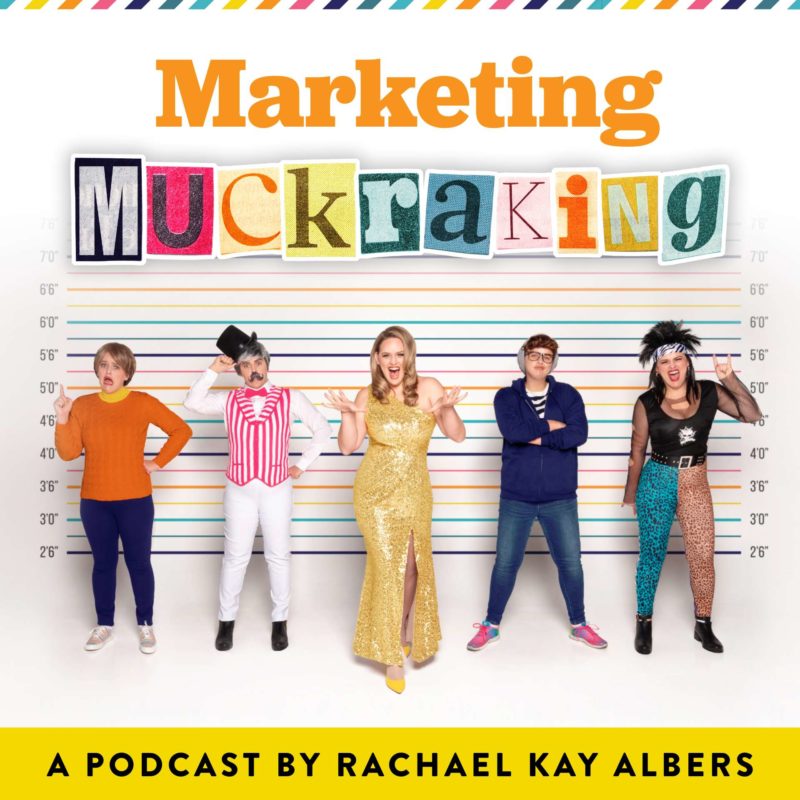
About the Marketing Muckraking podcast
Welcome to Marketing Muckraking, the show that asks not simply what brand culture can do for us, but what it’s doing to us — with your host, creative director, brand strategist gone wild, and the court jester of online business, Rachael Kay Albers — making fun of business and making business fun.
This is the show for rebels, revolutionaries, and renegades who run businesses that burn the rulebook. If you’re sick of business podcasts with all the answers — I’ve got nothing but questions.
Where we swap B School for FREE SCHOOL, easy for honest, and goal digging for marketing in pursuit of meaning.
If you love the show and want to support more marketing muckraking, please subscribe, review, share with your enemies, and if you really want to make my day, you can go to BuyMeARobe.com and leave a little something on the nightstand.

I have no freebie to tempt you with.
No automated email sequence to whisper sweet nothings into your inbox late at night.
Here’s what I do have: a hilarious show on how to market with integrity, sell your services & products successfully, and still not take yourself too seriously. Join me here:
